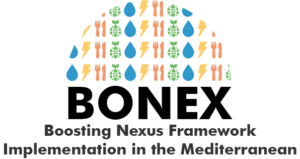 De mediterrane regio staat voor groeiende uitdagingen om de voedsel- en watervoorziening te waarborgen, aangezien landen te maken krijgen met een toenemende vraag en een afnemende beschikbaarheid van natuurlijke hulpbronnen. De nexus-benadering is gericht op het beheren en benutten van synergieën tussen sectoren door middel van efficiënt en geïntegreerd beheer van de Water-, Energie-, Voedsel- en Ecosystemen-nexus (WEFE).
De mediterrane regio staat voor groeiende uitdagingen om de voedsel- en watervoorziening te waarborgen, aangezien landen te maken krijgen met een toenemende vraag en een afnemende beschikbaarheid van natuurlijke hulpbronnen. De nexus-benadering is gericht op het beheren en benutten van synergieën tussen sectoren door middel van efficiënt en geïntegreerd beheer van de Water-, Energie-, Voedsel- en Ecosystemen-nexus (WEFE).
De doelstellingen van BONEX zijn het bieden van praktische en aangepaste hulpmiddelen, het onderzoeken van concrete en contextspecifieke technologische innovaties, het verbeteren van beleid en governance en het vergemakkelijken van de praktische implementatie van de WEFE-nexus, waarbij sociale, economische en ecologische afwegingen in balans worden gebracht.
Het project heeft als doel een nieuw, transdisciplinair diagnostisch WEFE-bridging framework te ontwikkelen, dat methoden op een contextspecifieke manier combineert en verder gaat dan disciplinaire silo’s. De diagnostische hulpmiddelen ter ondersteuning van dit framework zullen worden ontwikkeld en getest in zeven geselecteerde demonstratieprojecten in de regio, waarin innovatieve technologieën worden gepilot (zoals agrivoltaïsche systemen en systemen voor hergebruik van afvalwater).
Als resultaat zal BONEX beleidsmakers en praktijkmensen voorzien van een interactief besluitvormingsinstrument om afwegingen, synergieën en nexus-oplossingsbenaderingen op een transdisciplinaire manier te evalueren. Bovendien zal het waardevolle ervaringen opleveren met het op maat maken van innovatieve WEFE-nexus technologieën, wat nieuwe zakelijke kansen biedt. De WEFE-nexusbenadering is noodzakelijk om duurzame agrovoedselsystemen te implementeren en ecosystemen te behouden.
Binnen BONEX zal FutureWater actief bijdragen aan het pakket van diagnostische hulpmiddelen. Een eenvoudige waterboekhoudtool (REWAS) zal worden gebruikt om te evalueren of met innovatieve technologieën ‘echte waterbesparingen’ worden gerealiseerd. De waterboekhoudtool evalueert waterstromen op veldniveau en op schaal van irrigatiedistricten en bepaalt of er daadwerkelijk ‘echte besparingen’ worden behaald. De tool houdt ook rekening met voedselproductie (opbrengst van gewassen) en zal componenten introduceren voor het evalueren van energie- en waterkwaliteitsaspecten om de WEFE-nexusaspecten aan te vullen. De zeven demonstratieprojecten zullen worden gebruikt om deze waterboekhoudtool te demonstreren en iteratief te ontwikkelen. Een hydrologische analyse zal worden uitgevoerd op geselecteerde locaties om ook de impact op stroomgebiedschaal te evalueren. Uiteindelijk zullen de resultaten van deze analyses worden vertaald naar beleidsimplicaties en bijdragen aan de realisatie van de duurzame ontwikkelingsdoelen (SDG’s).
Dit project maakt deel uit van het PRIMA-programma, ondersteund door de Europese Unie.

 De mediterrane regio staat voor groeiende uitdagingen om de voedsel- en watervoorziening te waarborgen, aangezien landen te maken krijgen met een toenemende vraag en een afnemende beschikbaarheid van natuurlijke hulpbronnen. De nexus-benadering is gericht op het beheren en benutten van synergieën tussen sectoren door middel van efficiënt en geïntegreerd beheer van de Water-, Energie-, Voedsel- en Ecosystemen-nexus (WEFE).
De mediterrane regio staat voor groeiende uitdagingen om de voedsel- en watervoorziening te waarborgen, aangezien landen te maken krijgen met een toenemende vraag en een afnemende beschikbaarheid van natuurlijke hulpbronnen. De nexus-benadering is gericht op het beheren en benutten van synergieën tussen sectoren door middel van efficiënt en geïntegreerd beheer van de Water-, Energie-, Voedsel- en Ecosystemen-nexus (WEFE).